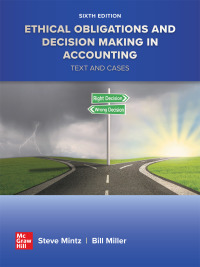Answer each of the following questions from the perspective of an auditors liability to a third party.
Question:
Answer each of the following questions from the perspective of an auditors’ liability to a third party. In each case, discuss whether the bank has a legitimate cause of action against the auditor and the legal principle that supports such an action.
(a) A client retains a CPA firm to audit the financial statements required by a bank as a condition to extending a loan to the client. The auditor knows the bank is the client’s principal lender and is aware of the bank’s reliance on the financial statements, particularly the valuation of accounts receivable. The bank and auditor have direct oral and written communication during the lending period and have met to discuss the client’s financial statements. After the audit report is issued, the bank discovers that the client’s accounts receivable were overstated. The client subsequently goes bankrupt and defaults on the loan. The bank alleges that the auditor failed to communicate about the inadequacy of the client’s internal recordkeeping.
(b) A client is negotiating a loan with a bank requiring audited financial statements. The client hires a CPA firm, explaining that the purpose of the audit is to negotiate a loan. The firm audits those financial statements. Subsequent to issuing the financial statements the client goes bankrupt mainly because the inventory was overvalued. In reality, the inventory was worthless. The auditor failed to point this out in the financial statements.
(c) A CPA audits a company and issues an opinion that the financial statements fairly represent the financial condition of the entity. A bank made loans to the client after receiving the audited financial statements. The financial statements contained numerous errors, and the client subsequently defaulted on the loans.
Step by Step Answer:

Ethical Obligations And Decision Making In Accounting Text And Cases
ISBN: 9781264135943
6th Edition
Authors: Steven Mintz





